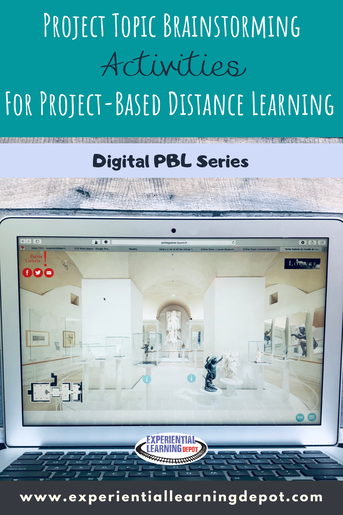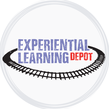|
Experiential learning resources for the innovative educator
If you've been following Experiential Learning Depot for a while, you know that my experience and passion lies in self-directed project-based learning, particularly when it comes to science topics (I'm a life science teacher). True student-directed learning encourages and offers ample opportunity for student choice. That includes students determining their own project topics and driving questions. When students have the flexibility to choose project topics and driving questions for ALL of their projects over the course of a session (see self-directed learning series for details), they can get overwhelmed with possibilites. This is especially true if you are not beside them in a face-to-face learning environment. If you're distance learning this fall, create a system for developing and organizing project topics. That system can include a digital brainstorming activity (FREE at ELD on TPT) that can be shared via Google Classroom. Another piece of this system is having students log or list project topics of interest that they can return to over the course of the session when in need of project inspiration. Once students have project ideas, they can list them out and design their projects using my digital personalized project-based learning bundle (personal learning plan and PBL tool kit). As they complete projects, they can showcase their work in my PBL assessment e-Portfolio, FREE when you subscribe to my mailing list. True self-directed project-based learning is much easier done in flexible learning environments such as those that have support from the district, those teaching an entire course on PBL or passion projects, advisories, home schools/coops. If this is not you, PBL can still be self-directed, there just wouldn't be a need for topic brainstorming because you would be assigning a general topic for students to cover. However, students can still choose a subtopic around a broader theme, determine how they will demonstrate learning, how they will share their final product with an authentic audience, etc. Check out my guided, themed PBL resources. If you are in a position to offer true self-directed project-based learning, check out how you can help learners brainstorm project-topics virtually! Project-Based Learning Topic Brainstorming Activities for Distance LearningBecause self-directed project-based learning is personalized, you need to start by building a relationship with every individual student. Get to know them. That can be a little more difficult when learning is taking place virtually. Before moving onto the following virtual brainstorming activities, grab my personal learning plan. This is a great way to begin to get to know your students. 1. Look at Interests Self-directed project-based learning is personalized, and part of that is identifying learners' interests. What do they enjoy? What are their strengths? What are their hobbies? The result of students developing projects around their interests is an intrinsic motivation to learn and a passion for learning. How do that? Start with an interest survey, especially if you are just beginning to know your students. Check out my free interest survey that can be shared digitally via Google Classroom. 2. One-On-One Conversation When working face-to-face with students, casual chat between us is the most effective way to determine a project topic. I go over their interest surveys with them, and/or their personal learning plan, ask them questions about their answers to those activities, and more. This almost always leads to a project topic that they can get excited about simply by allowing them to talk about themselves. But what about virtually? I highly recommend making time to meet with students via Google Meet, Zoom, or some other video conference tool, to have this conversation. You can also provide feedback directly to their Google Slides personal learning plan and/or interest survey, as they are both shareable with Google Classroom. 3. Project "Circle"/Group Share When we were in a classroom, my group had regular project circles, which is basically an opportunity for peer input. We would gather in a literal circle, go around and talk about projects that they are currently working on, what they may want to do next, lack of motivation and/or inspiration to start a new project, etc. The purpose of this is to get other students to add their input. It's a great big think tank rather than each student's only source of feedback coming from me. Virtually, though? Zoom! I know Zoom is getting old. But if you're distance learning, make time for it. I suggest a project circle at least once per week, ideally more. You could also start a class forum or discussion on Google Classroom where they can offer their ideas in text format. One student might need credit in economics and is having a hard time settling on a project topic around those standards. Other students can chime in with their experiences or ideas. 4. Standards-Driven Just because projects are student-led and they get to choose their topics, it is a reality that most students are required to meet specific standards/benchmarks or complete specific courses to graduate. This was the case at my school. So our students, in part, chose topics and designed their projects around standards that they need to meet. If a student needs to hit a benchmark in ecology, specifically as it relates to food webs, and they enjoy surfing, they may consider designing a project around the important role that sharks play as tertiary consumers. Have students pull up a new Google Doc. They can add a table with two columns, one with standards that they need to meet, and the other with project topics that would help them meet those standards. The personal learning plan available in my store includes this type of organizing tool, which is also editable to fit specific needs. 5. Sparks This is my favorite way to inspire project topics. A "spark" is a word coined by my boss that is essentially a learning activity that gets students excited about a topic or question. Part of my job as an experiential educator at an experiential school was to plan and organize these sparks. Examples include field trips such as a visit to a museum, local park, a nearby factory, a farm, etc. The purpose is to get students asking questions that can become driving questions for a project-based learning experience. But there are many other ways to spark project topics than going on field trips, thankfully, since we are currently not in a position to be going on any. So how can you provide sparks virtually or remotely?
There are many other options for sparks, you just have to keep your eyes and your ears open! My free project topic brainstorming activity mentioned above is all basically sparks compiled onto one document.
Let's summarize. What can you do to start self-directed project-based distance/remote learning today?
Follow Experiential Learning Depot on Pinterest and Instagram for more on experiential education, and check out my TpT store for experiential learning resources. Observe. Question. Explore. Share.
0 Comments
Your comment will be posted after it is approved.
Leave a Reply. |
Blog IntentTo provide innovative educational resources for educators, parents, and students, that go beyond lecture and worksheets. AuthorSara Segar, experiential life-science educator and advisor, curriculum writer, and mother of two. Categories
All
|







 RSS Feed
RSS Feed